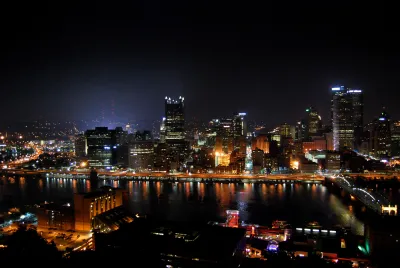As evidence showing the benefits of dark skies builds, Pittsburgh becomes the first eastern American city to enact a dark sky policy.

Pittsburgh became the first city in the eastern U.S. to adopt a 'dark sky' policy, reports Josyana Joshua, " meaning that it will switch to lower wattage LED bulbs and add shades along bridges, roads and other public areas" to reduce light pollution and energy use from public lighting.
Although it joins 34 other 'dark sky' communities that have committed to reduced lighting guidelines, "Pittsburgh will be the first city in the world to follow the International Dark Sky Association’s new values-centered outdoor lighting, which means it will follow the group’s more comprehensive suggestions surrounding wattage and color temperature as well as when and how to keep lights on." Dark sky advocates say light pollution disrupts ecosystems and natural processes that depend on light cues, writes Joshua. "It can also confuse the natural 24 hour day/night cycle for humans — a darker sky has been found to have positive effects on mental health, with stargazing and less blue light playing a part."
Despite concerns about safety, research from England and Wales shows that street lighting reductions did not negatively affect crime or car crash rates. Since Pittsburgh's announcement, other eastern cities and states have pushed forward dark sky initiatives of their own.
FULL STORY: Why Pittsburgh Is Dimming Its Streetlights

National Parks Layoffs Will Cause Communities to Lose Billions
Thousands of essential park workers were laid off this week, just before the busy spring break season.

Retro-silient?: America’s First “Eco-burb,” The Woodlands Turns 50
A master-planned community north of Houston offers lessons on green infrastructure and resilient design, but falls short of its founder’s lofty affordability and walkability goals.

Delivering for America Plan Will Downgrade Mail Service in at Least 49.5 Percent of Zip Codes
Republican and Democrat lawmakers criticize the plan for its disproportionate negative impact on rural communities.

Test News Post 1
This is a summary

Test News Headline 46
Test for the image on the front page.

Balancing Bombs and Butterflies: How the National Guard Protects a Rare Species
The National Guard at Fort Indiantown Gap uses GIS technology and land management strategies to balance military training with conservation efforts, ensuring the survival of the rare eastern regal fritillary butterfly.
Urban Design for Planners 1: Software Tools
This six-course series explores essential urban design concepts using open source software and equips planners with the tools they need to participate fully in the urban design process.
Planning for Universal Design
Learn the tools for implementing Universal Design in planning regulations.
EMC Planning Group, Inc.
Planetizen
Planetizen
Mpact (formerly Rail~Volution)
Great Falls Development Authority, Inc.
HUDs Office of Policy Development and Research
NYU Wagner Graduate School of Public Service





























